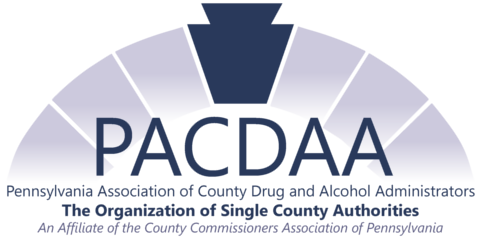Who is PACDAA?
The Pennsylvania Association of County Drug and Alcohol Administrators (PACDAA), an affiliate of the County Commissioners Association of Pennsylvania (CCAP), is a professional association that represents the 47 Single County Authorities (SCAs) across the Commonwealth. SCAs receive state and federal dollars through contracts with the Pennsylvania Department of Drug and Alcohol Programs (DDAP), to plan, coordinate, programmatically and fiscally manage and implement the delivery of drug and alcohol prevention, intervention and treatment services at the local level. SCAs also receive funding for treatment services from the Pennsylvania Department of Human Services (DHS), Office of Mental Health and Substance Abuse Services (OMHSAS). The services funded by DHS are primarily targeted to individuals in non-hospital residential care who are eligible for Medical Assistance or to a continuum of treatment services for those individuals no longer eligible as a result of welfare reforms.
History of PACDAA
In 1972, the Commonwealth of Pennsylvania established a Single State Agency and a system of Single County Authorities (SCAs) to implement substance use disorder prevention, intervention, and treatment services through county based planning and management. Act 63, the Pennsylvania Drug and Alcohol Abuse Control Act, requires the Department of Drug and Alcohol Programs to develop a State Plan for the control, prevention, intervention, treatment, rehabilitation, research, education and training aspects of drug and alcohol misuse and dependence programs. SCAs are charged with carrying out the state plan and developing a local plan that includes an array of recovery supports and services.
Mission Statement
The Mission of PACDAA is to improve services to Commonwealth residents by providing for its members:
A vehicle by which the Drug and Alcohol Administrators of Single County Authorities (SCAs) in Pennsylvania may exchange information among themselves, and with public officials, health and social services personnel, and the public at large regarding substance use related problems, and the availability of public and private services for the prevention, intervention, and treatment of substance use problems.
An organized means by which those SCAs may communicate with the Commonwealth agencies, including the Department of Drug and Alcohol Programs and the Department of Human Services, Office of Mental Health and Substance Abuse Services, around the issues of policy, planning, coordination, program development, and other relevant issues. A forum for the free exchange of information among the various public and private drug and alcohol agencies in the Commonwealth of Pennsylvania for the purpose of maintaining and improving the quality of services. The Association encourages collaboration with other organizations in the health and human services field to accomplish this purpose.
PACDAA recognizes the need for and importance of:
- Ensuring that care is managed adequately; both cost and appropriateness of care based on client needs
- Ensuring that taxpayer dollars are used effectively and efficiently
- Promoting recovery support services to assist client’s in becoming productive citizens
- Providing the continuum of care, including recovery support services, as the best way to enhance the client’s continued recovery
- Supporting comprehensive community-based prevention programs that empower and mobilize citizens to assume active roles in reducing substance use in their own communities
PACDAA and SCAs believe substance use disorder is a primary disease which, if left untreated, may result in physical and mental deterioration, incarceration and/or death. Untreated substance use disorder leads to the destruction of the individual, the family and the community. If substance use disorders are treated with clinical integrity, individuals can return to being productive members of their community.
Philosophy of Prevention
It is the belief of the PACDAA membership that “prevention” is one of the primary mechanisms that Pennsylvania can utilize to decrease drug and alcohol misuse and substance use disorders. Members believe in a process that guides the selection, implementation and evaluation of effective, culturally appropriate and sustainable prevention activities.
Related Information
Officers
- Kate Lowery, Chairperson
Beaver County - Pam Bell, Vice Chairperson Delaware County
- Joe Martellucci, Treasurer Lehigh County
- Rebecca Abramson, Secretary Lawrence County

